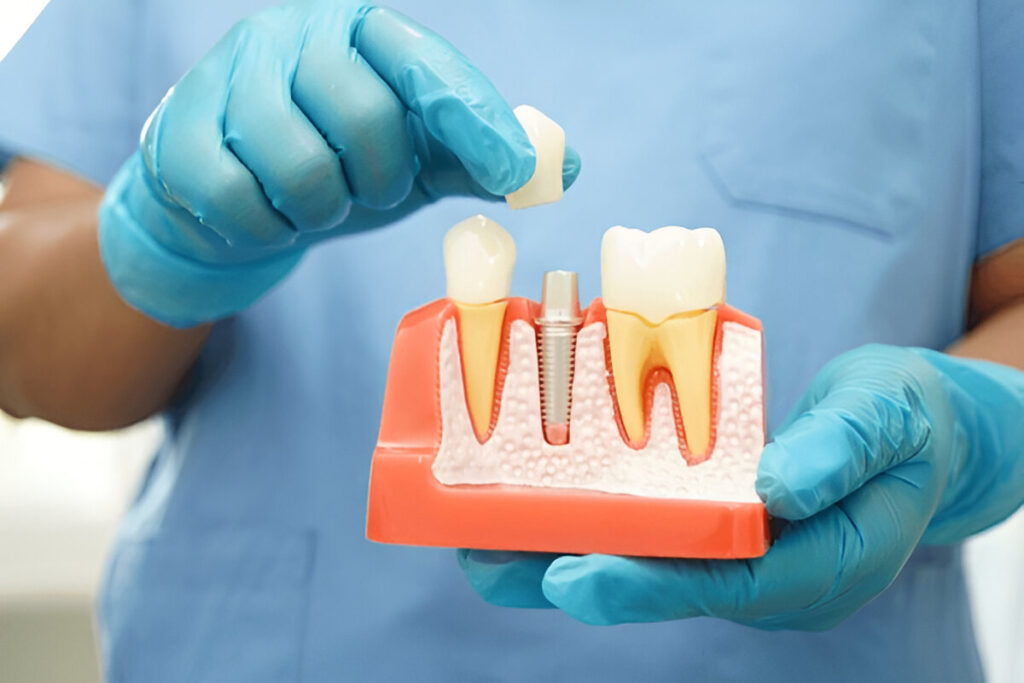Dental implants are a long-term solution for replacing missing teeth, providing stability, functionality, and a natural look. Implants consist of three main components: a titanium post, which is surgically embedded into the jawbone; an abutment, which connects the post to the artificial tooth; and a crown or other prosthetic tooth, custom-made to blend with your natural teeth. The titanium post integrates with the bone in a process called osseointegration, offering a stable foundation that mimics the root of a natural tooth.
With dental implants, patients can enjoy restored chewing ability, improved speech, and a confident smile. They are ideal for people with healthy gums and sufficient bone density. Dr. Edward Doktorman, a skilled implant specialist, offers personalized care, ensuring that each implant fits comfortably and functions well within the patient’s unique oral structure. Dental implants are known for their durability and can last a lifetime with proper care, making them a highly effective and permanent option for tooth replacement.
Dental implants types
There are several types of dental implants designed to meet diverse dental needs and conditions. Each type has unique features suited to different patients based on factors like bone structure, health, and specific tooth replacement needs:
- Endosteal Implants. These are the most common type, placed directly into the jawbone. They use titanium or ceramic posts shaped like screws to anchor replacement teeth securely. Endosteal implants are ideal for patients with sufficient bone density and healthy gums.
- Subperiosteal Implants. For patients with insufficient bone mass, subperiosteal implants rest on top of the jawbone but beneath the gum tissue. A metal frame holds the implant in place as it heals. This option is less common and typically recommended for those who cannot undergo bone grafting.
- All-on-4 Implants. This approach supports a full arch of teeth with just four implants, making it efficient for those needing full upper or lower tooth replacement. The implants are strategically angled to maximize bone contact, providing a stable foundation.
- Mini Dental Implants. Smaller than traditional implants, mini implants are used for cases where the jawbone cannot support a standard-sized implant. They are often chosen for supporting smaller prosthetics or for less invasive procedures.
- Zygomatic Implants. An alternative for patients with significant bone loss in the upper jaw, zygomatic implants are placed in the cheekbone (zygoma) rather than the jawbone. This complex procedure is often reserved for cases where other implant types are unsuitable.
- Immediate Load Implants. Also known as “same-day implants,” these allow the placement of a temporary crown on the same day as the implant, giving patients a quick solution for a missing tooth.
Each type of implant is chosen based on individual oral health, bone density, and the specific dental needs of the patient, with the goal of achieving a secure, natural-looking, and functional tooth replacement.
Dental implants aftercare
Aftercare for dental implants is essential to ensure proper healing and long-term success. Initially, after implant placement, avoid disturbing the surgical area and stick to soft foods for the first few days to minimize discomfort. Keeping the implant site clean is crucial to prevent infection; gently rinse your mouth with a saline solution or an antiseptic mouthwash, as recommended by your dentist. Avoid vigorous rinsing or using a straw, as this can disrupt healing.
Once healing progresses, establish a consistent oral hygiene routine that includes brushing twice daily with a soft-bristled toothbrush and flossing around the implant carefully to remove any food particles. Regular dental check-ups are also important; your dentist will monitor the implant’s stability and the health of surrounding gum tissue.
Avoid habits that could damage the implant, such as grinding teeth, smoking, or chewing on hard objects. Using a night guard may be advised if you grind your teeth. Following these steps will help maintain the integrity of your dental implants, promoting healthy integration with the jawbone and ensuring they remain functional and aesthetically pleasing for many years.



